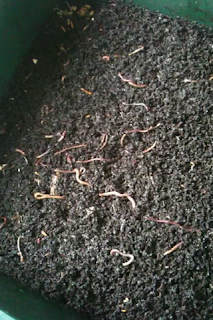Vermicomposting
I heard a story about farm lands than have been overworked, so they used synthetic fertilizers to grow their crops. If they stopped using the synthetic fertilizers then nothing would grow at all. I heard about a study where the soil was checked for quality in a farmer's field and the best soil was right around the fence line. Because the farmer didn't plow there, the worms were undisturbed. The synthetic fertilizer wasn't there to kill the worms or degrade the soil quality.
I was curious about worms already and then my daughters and I went to a gardening expo. There was a man there selling worm bins calling it vermicomposting. My youngest daughter bought me one for Mother's Day (thanks, Cindy). The worm man taught me how to care for it.
Basically, you keep your worms in a bin and you throw in your organic garbage. Everything they eat they poop out as fertilizer. It looks, feels, and smells like rich potting soil. If you do it right, then it doesn't stink. It actually doesn't even have a smell. I keep my worms outside in the spring and summer, but in the winter I bring them in. I love my worms and I don't want them to be cold.
At the end of this season I harvested two bins of worm castings. When I collected it, I put it in a 5 gallon bucket with a lid and store it. I'll just store it until I am ready to use it. So far I have used it on every house plant and potted plan that I have. My flowers, tropical plants, blueberries clematis, and lilac. I put in anywhere from 3 tablespoons to 2 cups depending on the size of the plant.
I put the worm castings in my tulip cactus because it was in dire need. All of the other plants got the worm poop about 2 weeks ago so I haven't seen how it has effected them yet. I expect to have 5 gallons of worm poo by next spring. They slow down production in the winter time, but because they live in the house during the winter, it doesn't stop completely.






0 comments:
Post a Comment